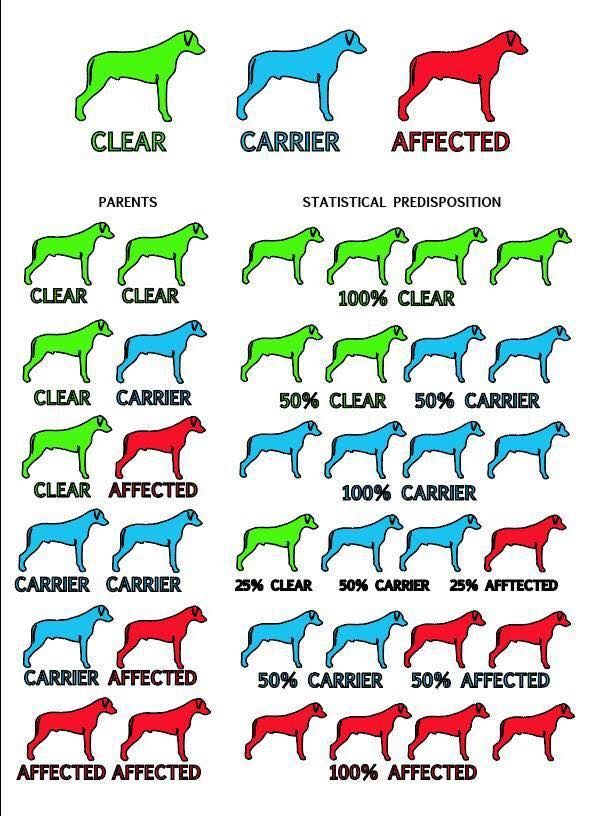Health & DNA testing
Please read through the following information to educate yourself on certain health issues in the breed & why breeders should Health & DNA test.
Hip/elbow Dysplasia:
Canine hip dysplasia is characterized by varying degrees of hip joint laxity (looseness), subluxation (partial dislocation), and ultimately, severe arthritic change. Clinically, the symptoms range from having no clinical signs in some affected dogs to crippling disease in others. In addition, the severity of the clinical signs does not necessarily correlate with the degree of radiographic (x-ray) or pathologic changes seen.
Elbow Dysplasia is a heritable condition common to large breed dogs. It's thought to be caused by different growth rates of the three bones that make up the dogs elbow, causing joint laxity. This can lead to painful lameness.
It is neccessary for a breeder to hip/elbow score their breeding dogs to determine their scores before making a choice of a suitable sire/dam.
For breeding Rhodesian Ridgebacks, aim for a total hip score well below the breed's median score of 11. A score of 0-6 is excellent, 7-9 is good, and 10-18 is slightly above the median. Breeders should also consider the dog's pedigree and any available Estimated Breeding Values (EBVs) to make well-rounded decisions, and ideally, the dog's elbows should be ideally scored as zero.
The recommended elbow score for breeding is a grade of 0/0 for both elbows. Dogs with a score of 0 have healthy elbows with the lowest risk of passing on elbow dysplasia, while dogs with scores of 1, 2, or 3 have moderate to severe changes and should not be used for breeding to minimize the risk of heritability.
Dermoid Sinus:
A dermoid sinus, also known as a pilonidal sinus, is a tubular skin defect caused by incomplete separation of the skin and the nervous system during embryonic development. The sinus can be found at any point along the back or neck, but most commonly affects the neck or upper spine. The depth of the defect varies, the tube:
- may extend into the tissue just beneath the skin,
- may extend deeper and connect to the membrane covering the spinal cord (dura mater) or
- it may be a blind ended sac beneath the skin
Dermoid sinus is most common in Rhodesian ridgebacks, in which it is congenital and heritable. Therefore, affected pets should not be bred. The condition has also been reported in other breeds. Surgery can now be performed to remove a DS (dermoid sinus) by experienced veterinary surgeons. All puppies are checked from birth until going to their new homes for this defect.
DM: (Degenerative Myelopathy)
Degenerative Myelopathy caused by Mutation of the SOD1 gene is an inherited neurologic disorder of dogs. This mutation is found in many breeds of dog, including the Rhodesian ridgeback. While it is not clear for some of the other breeds, Rhodesian ridgebacks are known to develop degenerative myelopathy associated with this mutation. The variable presentation between breeds suggests that there are environmental or other genetic factors responsible for modifying disease expression. The average age of onset for dogs with degenerative myelopathy is approximately nine years of age. The disease affects the White Matter tissue of the spinal cord and is considered the canine equivalent to amyotrophic lateral sclerosis (Lou Gehrig’s disease) found in humans. Affected dogs usually present in adulthood with gradual muscle Atrophy and loss of coordination typically beginning in the hind limbs due to degeneration of the nerves. The condition is not typically painful for the dog, but will progress until the dog is no longer able to walk. The gait of dogs affected with degenerative myelopathy can be difficult to distinguish from the gait of dogs with hip dysplasia, arthritis of other joints of the hind limbs, or intervertebral disc disease. Late in the progression of disease, dogs may lose fecal and urinary continence and the forelimbs may be affected. Affected dogs may fully lose the ability to walk 6 months to 2 years after the onset of symptoms. Affected medium to large breed dogs, such as the Rhodesian ridgeback, can be difficult to manage and owners often elect euthanasia when their dog can no longer support weight in.
Genetic testing of the gene in RR's will reliably determine whether a dog is a generic carrier of DM. DM is inherited in an autosomal reccessive manner in dogs meaning that they must receive two coppies of the mutated gene (one from each parent) to develop the disease.
Carrier dogs do not have features of the disease but if bred to a another carrier there is a risk of producing affected puppies. Reliable genetic testing is important for determining breeding practices & selecting the correct sire or dam as what we are avoiding is producing affected dogs not avoiding the carriers. Genetic testing should be performed before breeding.
JME - Junior Myoclonic Epilepsy - Discovered Summer 2016
JME is an inherited disease in the Rhodesian Ridgeback breed. Affected dogs start showing symptoms between the age of 6 weeks and 18 months. Symptoms include frequest myoclonic jerks or twiches especially when the dogs are sleeping or resting. Photo sensitivity has also been noticed in affected dogs. Most affected dogs will also develop more severe generalized and tonic clonic seizures.
Due to the recessive mode of inheritance, affected dogs must inherit two copies of the mutation, one from each parents.
The test will tell you if your dog is Clear (N/N) or a carrier (N/ JME). Carrier dogs are healthy dogs and will not develop the specific symptoms associated with the JME mutation. This is a reccessive gene.
Carrier dogs do not have features of the disease but if bred to a another carrier there is a risk of producing affected puppies. Reliable genetic testing is important for determining breeding practices & selecting the correct sire or dam as what we are avoiding is producing affected dogs not avoiding the carriers. Genetic testing should be performed before breeding.
Below is a diagram of how breeding clear, carriers, affected works.
Please note that there are other forms of epilepsy that cannot be eliminated by this test.
Blue Dilute:
What is colour dilution?
There's a wide variety of genes that influence coat color in dogs. Only some genes are identified using DNA. The dilution series is a relatively simple series.
This locus is classically known as the D locus and contains the melanophilin gene (MLPH). There are two allels at the dilute locus, which are called D (dominant, full pigmentation) and d (recessive, dilute pigment). Coat color dilution is inherited as monogenic recessive trait and is displayed by dogs with the genotype dd, whereas dogs with the genotype DD or Dd show the normal coat color. Again it importmant to DNA test for dilute so we can avoid breeding a fault coloured dog.

